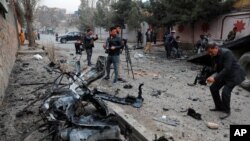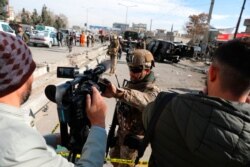As the Taliban advance across Afghanistan, over 90 media outlets have closed down and concern for the safety of the country's journalists has increased.
Afghan officials said Wednesday that most of the outlets were in provinces that the Taliban have reached.
In southern Helmand alone, 12 radio and four TV stations closed because of intense fighting in the provincial capital, Lashkar Gah, officials and journalists said.
"People cannot go out of their houses," said Sifatullah Zahidi, founder of Sukoon Radio in Helmand. "As a safety measure, we ceased broadcasting two days before the fighting expanded to the area of the city where our station is located."
Zahidi, who is also a reporter for the Kabul-based 1TV, told VOA that most of the journalists work from home.
"As a reporter, I am supposed to go and report from the front line, but I cannot," he said. "The fighting is going on [in the city]. Bullets are coming from everywhere. Rockets are landing and airstrikes are carried out."
The fighting severely damaged Sukoon Radio's offices, Zahidi said. "The total approximate cost of the damages could be around $20,000," he said.
Aziz Ahmad Shafi, a freelance journalist who has worked in Helmand for the past 15 years, told VOA that journalists are also restricted in their movements. They cannot travel to other districts in the province unless they coordinate with the Taliban.
"The Taliban told us to contact them if we want to go somewhere," said Shafi, adding that two journalists who wanted to leave the city earlier this month were detained.
Fortunately, "after we contacted the Taliban, they were released," he said.
The Taliban are still holding one journalist. Nematullah Hemat, who works for Gharghasht TV, was taken from his home in Lashkar Gah on August 9.
The journalists' colleagues are in contact with the Taliban to try to mediate, Shafi said. "God willing, he will be released soon."
Kabul's government has also detained journalists. Authorities arrested four on propaganda charges after they traveled to Spin Boldak district in Kandahar to interview the Taliban.
The Interior Ministry said the journalists had ignored a warning not to travel to the area.
Increased violence
The risks for journalists were further brought home Monday, when Toofan Omari, a radio manager who also worked as a prosecutor, was killed in Kabul. Omari is the fourth journalist to be killed in Afghanistan in the past three months.
No group has yet claimed responsibility, but Afghan officials blamed the Taliban.
The Taliban have not commented on Omari's death, but the group did claim responsibility for the killing of government spokesperson Dawa Khan Meenapal outside a mosque on August 6.
Before working for the government, Meenapal was a reporter for Radio Free Europe/Radio Liberty's Afghan service, where he won an award for his bravery.
The Taliban have increased attacks on government-held areas in Afghanistan and say they have captured nine provincial capitals.
Shiwai Sharq, the deputy minister for Afghanistan's Ministry of Information and Culture, told VOA that 46 journalists have moved from provinces to Kabul due to the fighting and threats.
The government is planning to move more journalists to Kabul from at least 10 provinces, he added.
"We are trying to help with their relocation to Kabul. We will also help them financially. We do this through the journalists and media support fund," Sharq said.
In a further impact to Afghanistan's journalism community, the Ministry of Information and Culture said last week that more than 1,000 people working in media, including 150 women, have lost their jobs due to the violence.
'Critical moment'
Mujib Khalwatgar, head of media advocacy group Nai, described the current situation as a "critical moment" for the country's media.
The fighting and Taliban advances "could erase one of the main gains of the past two decades," Khalwatgar said.
"Our journalists are facing threats. Media outlets are shutting down. We are in the worst financial situation, and access to information is limited," Khalwatgar said.
International news outlets in the U.S. and U.K. and media rights groups have called for urgent action to protect the country's journalists and help some to resettle overseas.
The Taliban's control over large parts of the country "poses an unprecedented threat to independent journalists and media," media watchdog Reporters Without Borders reported last week.
Khalwatgar highlighted the important role that media play as independent observers.
"Journalists are neutral individuals," Khalwatgar said. "We request (the Taliban) abide by the laws of war and what their leaders promised."
















